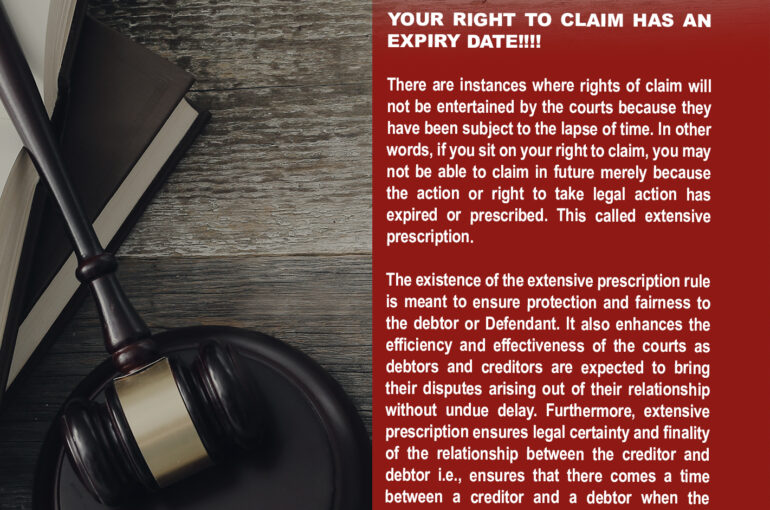Molato wa bola!
YOUR RIGHT TO CLAIM HAS AN EXPIRY DATE!!!!
There are instances where rights of claim will not be entertained by the courts because they have been subject to the lapse of time. In other words, if you sit on your right to claim, you may not be able to claim in future merely because the action or right to take legal action has expired or prescribed. This called extensive prescription.
The existence of the extensive prescription rule is meant to ensure protection and fairness to the debtor or Defendant. It also enhances the efficiency and effectiveness of the courts as debtors and creditors are expected to bring their disputes arising out of their relationship without undue delay. Furthermore, extensive prescription ensures legal certainty and finality of the relationship between the creditor and debtor i.e., ensures that there comes a time between a creditor and a debtor when the books are closed. As this rule primarily favors the debtor, it, to some extent also favors the creditor in gathering proof with ease while the matter is still fresh which would favor his case against the debtor.
EXTENSIVE PRESCRIPTION UNDER THE ACT
The periods of extensive prescription are provided for under Section 4 of Prescriptions Act. They are set out as follows:
a) A period of one (1) year for defamation suits, reimbursement for defective goods from a sale contract and for actions where buyers are claiming to reduce purchase prices for defective goods.
b) A period of three (3) years for claims relating to oral contracts, renumeration for services provided or work done, payment of purchase price for goods provided, rent in arrears, payment of damages etc.
c) A period of six (6) years for claims relating written contracts including bills of exchange (e.g., cheques and promissory notes) but does not extend to mortgage bonds.
d) Thirty (30) years in respect of mortgage bonds, judgments of a court of law for payment of money or for specific performance or other such judgments which require further action by the person in whose favour they have been given to secure compliance therewith, or any other action for which a period has not been provided in the Act.
In the event that a single claim is subject to two or more periods of prescription, the Act specifies that that longest period between the conflicting periods is the period of prescription that applies to that claim.
WHEN DOES THE PRESCRIPTION PERIOD START?
Extensive Prescription starts when the debtor is known by the creditor or from the date when the wrong from which the claim for damages is based upon is brought to the knowledge of the creditor or when the creditor is reasonably expected to have known about the wrong. For any other action other than that to claim for damages, extensive prescription begins when the right of action first accrued against the debtor.
CAN THE PERIOD BE INTERRUPTED?
When the extensive prescription period is interrupted by any of the acts specified by the Act then the debtor is precluded from raising prescription as a defense to a claim instituted by the creditor thereafter. The period will be deemed to have started afresh after the interruption. According to the Act, extensive prescription can be interrupted when: –
a) the debtor acknowledges the debt by admitting liability either orally or in writing, or making part payments of the debt, or paying the interest, or giving security for the debt.
b) by service on the debtor for any court process instituted.
c) Submission to arbitration
d) Filling a claim against an insolvent estate, claim against estate of a deceased, or from a company in liquidation.
Therefore, it is important, and it is encouraged that a creditor or any party with a right to claim or institute an action against a debtor observes the time constraints relating to the enforcement of their rights before they prescribe so that the courts may entertain the matter.



Leave a Reply